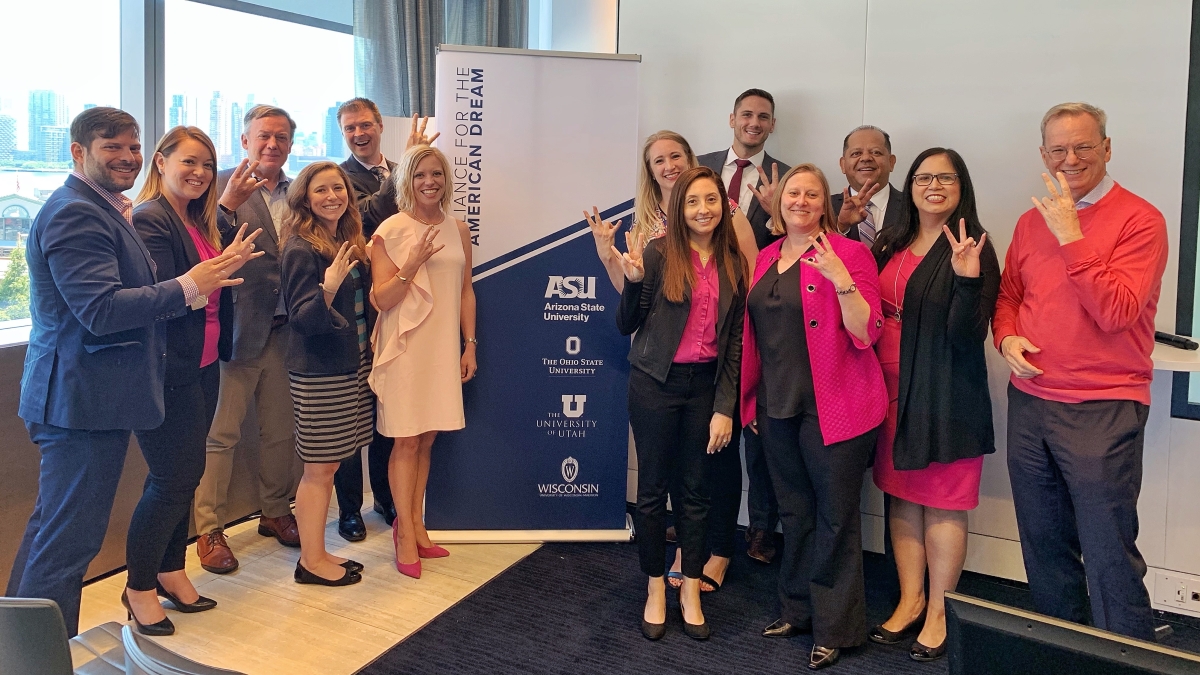Arizona community team wins first place in Alliance for the American Dream competition

From left: Andrew Magliozzi (AdmitHub), Karla Robles (Be a Leader Foundation), ASU President Michael M. Crow, Jacqueline Smith (ASU), Rich Nickel (College Success Arizona), Rachel Yanof (Achieve60AZ), Heidi Doxey (College Success Arizona), Julie Sainz (Arizona Commission on Postsecondary Education), Andrew Nelson (ASU), Missy Pizzo (ASU), Edmundo Hidalgo (ASU), Sylvia Symonds (ASU) and Eric Schmidt (Schmidt Futures).
Project Benjamin, a cross-sector coalition of organizations from Arizona, was provisionally awarded $1 million from Schmidt Futures in the Alliance for the American Dream competition Thursday in New York for its plan to use a chatbot to scale a strategy to boost Free Application for Federal Student Aid (FAFSA) completions in 67 area high schools.
In 2018, Schmidt Futures enlisted four public universities — Arizona State University, the Ohio State University, the University of Utah and the University of Wisconsin-Madison — to participate in the Alliance for the American Dream, an initiative aimed at sourcing solutions to increase the net income of 10,000 local households by 10%. With an average annual federal financial aid award of nearly $9,900, Project Benjamin is poised to exceed the grant challenge.
Arizona is 49th in the country for FAFSA completion, with only 45% of high school seniors completing the form that determines current and prospective U.S. college students' eligibility for federal financial aid. The state has a goal that by 2030, 60% of adults in Arizona ages 25 to 64 will hold a licensed degree or credential, about 15 percentage points above current rates.
“There are a lot of steps that have to be taken to actually get to that culminating point of attainment, and FAFSA completion is a great leading indicator that we are moving toward the right direction,” said Rachel Yanof, executive director of Achieve60AZ, part of the Project Benjamin coalition. “Given that we only have 10 more years until we hit the year 2030, we need as many leading indicators and actions toward those leading indicators to show that we’re making progress. So to me, this is a massive step.”
Before this competition, the team had successfully piloted a three-tiered support model in Phoenix Union High School District and Mesa Public Schools, significantly improving FAFSA completion rates. Project Benjamin will scale the human-capital-intensive model by integrating an artificial-intelligence-powered chatbot, Benjamin, to offer effective one-to-one support for FAFSA completion. Students will be able to text Benjamin their FAFSA questions and get immediate answers at any time of the day. Additionally, Benjamin provides text-message nudges about events, items to complete and important next steps.
“We knew going into this that we had a successful model that was labor-intensive,” said Rich Nickel, president and CEO of College Success Arizona. “What we really wanted to think about — and what this challenge allowed — was for us to envision technology and smart technology as an amplifier of what we were already doing. ... This is really what's going to move the needle with FAFSA completion.”
Project Benjamin shared first place with the team LIFT Dane (Wisconsin) and was awarded $1 million, pending the execution of a contract. Sharing second place were the teams Coal Country Strike Team (Utah), Power of Home (Ohio) and We Care for Dane Kids (Wisconsin). With the additional funding, the Arizona team will deploy Benjamin in 15 school districts starting in August and begin statewide marketing campaigns to shine on light on the benefits of completing the FAFSA.
“This investment on the part of the Schmidt Futures will have a catalytic effect on our collaborative partnerships, benefiting our schools, students and families,” said Sylvia Symonds, associate vice president for Educational Outreach and Student Services at ASU. “We will utilize technology in a way that previously we have not had the means to do so. This will allow us to scale some very promising initial efforts into a more comprehensive FAFSA completion strategy.”
Project Benjamin is composed of subject-matter experts from ASU, College Success Arizona, Achieve60AZ, the Arizona Commission on Postsecondary Education, Helios Education Foundation, Mesa Public Schools, Maricopa Community Colleges, Be A Leader Foundation, AzCAN and AdmitHub.
“This crucial project demonstrates our institutional commitment to encourage the growth and resilience of the communities we serve,” said ASU President Michael M. Crow. “We are excited and appreciative of the opportunity to make this new tool available to more learners in support of their academic access and success.”
ASU is also participating in the second cycle of the Alliance for the American Dream, with the target year of 2022 for the challenge of increasing the net income of 10,000 middle-class households. Teams will be selected from a local competition to compete at the national level, with the winners set to pitch for up to $1 million of implementation funding. Learn more at americandream.asu.edu.
The Alliance for the American Dream is supported by Schmidt Futures, a philanthropic initiative founded by Eric and Wendy Schmidt that bets early on people who will make our world better — helping people to achieve more for others by applying advanced science and technology thoughtfully and by working together across fields. ASU is an inaugural member of this alliance along with The Ohio State University, the University of Utah and University of Wisconsin-Madison.
Please direct all inquiries about ASU’s participation in the Alliance to Andrew Nelson, program manager, Strategic Network Advancement: 480-727-3491 or nelson.andrew@asu.edu.
More Arts, humanities and education

ASU professor's project helps students learn complex topics
One of Arizona State University’s top professors is using her signature research project to improve how college students learn…

Award-winning playwright shares her scriptwriting process with ASU students
Actions speak louder than words. That’s why award-winning playwright Y York is workshopping her latest play, "Becoming…

Exceeding great expectations in downtown Mesa
Anyone visiting downtown Mesa over the past couple of years has a lot to rave about: The bevy of restaurants, unique local shops…

